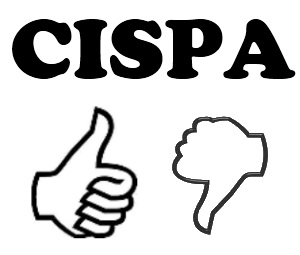The goal behind Cyber Intelligence Sharing and Protection Act (CISPA) is “To provide for the sharing of certain cyber threat intelligence and cyber threat information between the intelligence community and cybersecurity entities, and for other purposes” Bill Number H.R.3523. The bill itself is currently worded in such a way that it is starting to cause alarm similar to what was seen with the SOPA and PIPA legislations. The Center for Democracy and Technology (CDT) lists the following large issues with this bill:
- CISPA has a very broad, almost unlimited definition of the information that can be shared with government agencies and it supersedes all other privacy laws.
- CISPA is likely to lead to expansion of the government’s role in the monitoring of private communications.
- CISPA is likely to shift control of government cybersecurity efforts from civilian agencies to the military.
- Once the information is shared with the government, it wouldn’t have to be used for cybersecurity, but could instead be used for other purposes.
The U.S. House of Representatives has released its own key points concerning the bill:
- Helps private sector job creators defend themselves from attacks from countries like China by allowing the government to provide the intelligence information needed to protect their networks and their customers’ privacy;
- Keeps the federal government’s hands off the Internet, and does not allow the government to stop access to particular websites, or to censor or require private companies to remove content;
- Protects Americans’ privacy by prohibiting Washington from forcing private companies to hand over information while encouraging companies to “anonymize” information voluntarily shared with others;
- Does not impose new federal regulations or mandates, and does not require additional spending or bureaucracy; keeps Washington out of the business of monitoring or guarding private networks; and
- Was written in the open in a bipartisan way with input from private-sector companies, trade groups, privacy and civil liberties advocates, and the Executive Branch – and concerns will continue to be addressed.
For more information on both sides of the issue, check out the following resources:



